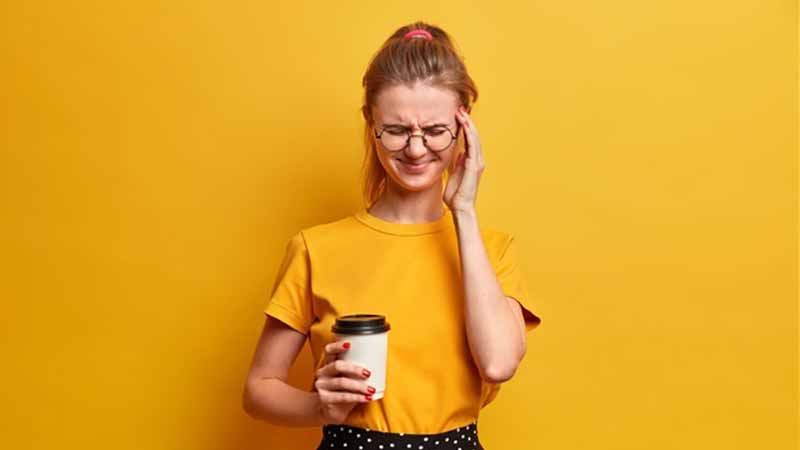Caffeine And Depression: Is There A Link?
- 39 months ago
You might not find a direct link between caffeine and anxiety depression. However, there's an apparent connection between depression and caffeine in people who're sensitive to caffeine and consume high quantities of it. Such people may experience depression more frequently than others.
For instance, a study found that healthy college students who consume moderate to high levels of coffee scored higher on the depression scale than those who consumed less.
Want to learn more about the link between depression and caffeine? If you said yes, read along. Below you'll find information on how caffeine affects your mood, how much caffeine is good, risks associated with caffeine consumption, and more.
How Does Caffeine Affect Your Mood?
Caffeine can affect your mood in the following ways-
1. Boost Energy Levels
Caffeine blocks fatigue causing adenosine receptors, consequently increasing the excitability in the brain. It acts as a Central Nervous System stimulant, which is why people consume coffee (rich in caffeine) to feel more energetic and alert.
Caution- However, you should avoid taking it after 2 p.m. or 3 p.m. you sleep at 9 p.m. It’s because caffeine takes 6 hours or even more of your day’s sleep. This means if you consume coffee at 4-5 p.m. you won’t be able to sleep for the next six hours.
2. Improves Hedonic Tone
Confused, what is a hedonic tone? The hedonic tone is the degree of pleasantness and unpleasantness kindred with a given state. Research has suggested that the people who consume low to moderate doses of caffeine, let's say around 2 to 5 cups of coffee per day, might experience a better hedonic tone and reduced anxiety.
Caution- High doses can increase tension, restlessness, and anxiety.
3. Might Make You Feel Happy for Some Time
Caffeine stimulates the neurotransmitters in our brain, which in turn help you achieve sustained attention, good mood and feel happy. It also enhances your physical strength, reduces laziness, and boosts energy.
Caution- Caffeine can make you feel good at first, but after its effect wears off, it can leave you feeling low.
These were some of the effects caffeine has on an individual's mood.
Caffeine affects our mood positively, but with some restrictions. In addition, it's important to note caffeine's effect on our mood is not permanent. It persists only for the first four hours after ingestion.
Is Caffeine Good for Depression?
Yes, but only up to some extent. Many studies like part of nurses' health study, cohort study of British men, Japanese cross-sectional study, Korean cross-sectional study combined suggest that caffeinated coffee has a protective effect on the risk of depression.
This also suggests that women who consume at least 2-4 cups of coffee every day are less likely to develop depression (It’s important to note that it might not favor everyone, 4 cups of coffee may fire back some individuals). However, a study said this effect was limited to coffee only, and was not completely extended or found with tea or caffeine alone.
How Much Caffeine Should You Consume Every Day?
Coffee can protect you from depression, but it can also worsen the symptoms. For example, it may temporarily help people with depression improve their mood, but consuming too much can lead to nervousness, increased heart rates, dehydration, etc.
Therefore, you should always consume caffeine in a limited amount. The recommended safe amount of caffeine is around 400 milligrams.
Caffeine Content in Different Drinks and Products
Four hundred milligrams of caffeine is roughly four cups of brewed coffee, two "energy shot" drinks, or ten cans of cola. (Can be too much for some people)
Here are the top products and amount of caffeine in them-
| 1 | Instant coffee | 75mg/per cup |
| 2 | Espresso | 100mg/per ½ cup |
| 3 | Energy drinks | 28-87mg/per glass |
| 4 | Cola drinks | 8-53 mg/per glass |
| 5 | Other soft drinks | 24mg per/glass |
| 6 | Chocolate | 5.5-35.5mg/per 1 ½ cup |
Risks of Having Too Much Caffeine
People who consume too much caffeine are likely to suffer from various issues such as:
- Headaches
- Anxiety
- Increased Heart Rates/ Blood Pressure
- Restlessness
- Nausea
- Palpitations
What's more, people experience caffeine withdrawal symptoms very often as it is a stimulant. Caffeine addiction and depression are correlated as caffeine withdrawal trigger symptoms that imbricate depression and anxiety. Thus, people with depression should consume caffeine in moderation.
Coffee or Tea for Anxiety and Depression
Both coffee and tea may help you deal with anxiety and depression up to some extent, while to others it may aggravate. However, the effectiveness of coffee in treating depression is way more than regular tea (Again, just temporarily). If you wish to deal with depression or anxiety, coffee or tea is not what you should be consuming, rather, green tea will prove to be a healthy alternative.
Green tea contains caffeine that is safe for consumption and comes with no side effects or risk factors.
Wrapping Up
Several studies prove that caffeine and depression are linked. However, there’s more proof required to prove that too much caffeine consumption causes depression or depression leads to excessive caffeine consumption.









